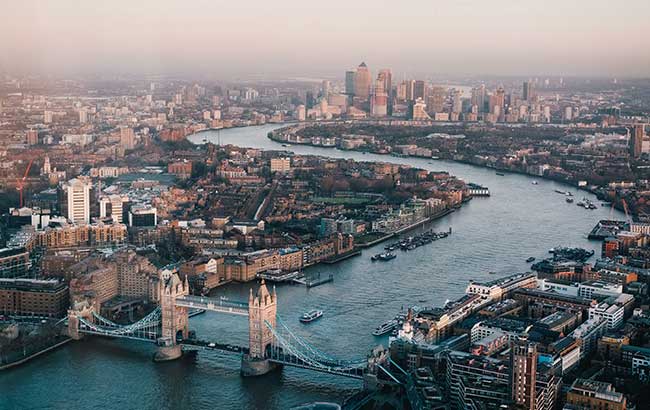UK Budget 2021: drinks industry reacts
By Kate MalczewskiThe UK’s autumn Budget laid out several measures that will have a massive impact on the spirits and hospitality industries. We gathered the perspectives of trade leaders to learn how the sector is responding to a revamped alcohol duty system, discounted business rates and more.

In his Budget announcement yesterday (27 October), chancellor Rishi Sunak scrapped the planned tax hike on spirits – a move welcomed by distillers.
What’s more, he revealed a major transformation of the current “outdated” alcohol duty system, in which drinks with stronger ABVs will be taxed higher rates. “It will help end the era of cheap, high-strength drinks which can harm public health and enable problem drinking,” Sunak said.
Meanwhile, the hospitality sector received relief in the form of a 50% business rates discount worth almost £1.7bn (US$2.3bn).
Read on for the industry’s response to Sunak’s new policies.
Scotch Whisky Association

Karen Betts, chief executive of the Scotch Whisky Association (SWA), hailed the freeze on spirits duty as a “welcome relief to all distillers, specifically in Scotland where 92% of all UK spirits are produced or bottled”.
“It’s confirmation that the UK government wants to support one of Scotland’s most important industries and will take action to protect jobs, investment and exports, and to bolster the recovery in hospitality and tourism,” she said.
However, Betts said more information is needed regarding the new alcohol duty structure. “The UK government must go further if it’s to meet its promise to ensure the tax system is supporting Scotch whisky,” she commented.
“Despite the duty freeze, spirits are still taxed more than beer, wine and cider, and we will now want to scrutinise the reform proposals announced by the chancellor. At first glance, it appears that Scotch whisky will continue to be put at a competitive disadvantage against beer and cider through the tax system, rather being allowed to compete on a level playing field.”
Night Time Industries Association
Trade group the Night Time Industries Association (NTIA) believes some of the Budget’s measures “will enable the hospitality sector to continue to drive the economic recovery,” according to Michael Kill, the organisation’s CEO.
“The announcements on business rates relief for hospitality, the simplification of alcohol duties, and the cut in duty for draught beverages will be welcomed by thousands of businesses in the night-time economy. This sector was devastated by the pandemic, with many businesses sadly not making it through, but the resilience we have shown to this point has been incredible,” he said.
“Despite this, businesses are still suffering from increased operating costs and with the potential for interest rates to go up being very problematic, as so many having taken on debt during the pandemic. To these businesses, the announcement’s today will be important in allowing them to continue to support the wider recovery, and ensuring a limit to the extent of increased prices being felt by consumers.”
Meanwhile, Kill was “disappointed” that the chancellor did not make the hospitality VAT rate of 12.5% permanent. “This is a missed opportunity, and it will prevent [positive] forecasts from improving further still,” he commented.
Yesterday (27 October), the NTIA revealed that nightclubs in Scotland could lose £506,000 (US$694,034) on average every year if the vaccine passport scheme for entry remains. It follows the trade body’s plans to take legal action against the Scottish government for the implementation of the passport scheme for nightlife venues.
UK Hospitality

Industry body UK Hospitality, led by chief executive Kate Nicholls, also welcomed the halving of business rates for the sector, though she expressed caution: “The devil will be in the detail, so we look forward to learning to what extent it will benefit businesses,” she said.
Nicholls was optimistic about the Budget’s simplification of the alcohol duty system, noting the chancellor’s “innovation and creativity in reforming an archaic system of duty”. Still, she called on the government to provide additional support for the industry.
“Positive as these announcements are, hospitality remains incredibly fragile, facing myriad critical issues. Rising utility bills, wage bills and food and drink prices have resulted in 13% inflationary costs that businesses are having to absorb at the same time as they navigate severe supply chain issues and chronic staff shortages. Given this toxic cocktail, it is imperative the government go further to support businesses in our sector,” she said.
“The most effective way to achieve this would be to maintain the current lower 12.5% of VAT for the sector. The chancellor has been bold and radical with alcohol duty – we urge him to adopt the same approach when implementing root and branch reform of business rates, to ensure industries share the burden equally.
“Hospitality has shown this summer that it has the potential to kickstart the nation’s recovery and deliver jobs, growth and investment at pace across all parts of the country but that could grind to a halt next year. It can only lead recovery with the right measures of support in place.”
Wine & Spirit Trade Association

The Wine & Spirit Trade Association (WSTA) characterised the wine and spirits duty freeze as a “much-needed break” for British businesses.
Miles Beale, WSTA chief executive, commented: “The chancellor should be commended for listening to our calls for support and understanding that punishing tax hikes are not the best way to reinvigorate the sector. By offering continued respite to the UK wine and spirit sector his actions will help save jobs and – in time – replenish revenues to the Treasury through growth in our potential-filled sector.”
He was less enthusiastic about the revamped alcohol duty scheme, which he said “does not make the regime fairer” – particularly for spirits.
“We are mystified by a proposal that embeds unfairness between products meaning that beer will be taxed between 8p-19p per unit, wine increases to 26p per unit and spirits remains at 29p per unit,” he concluded.
Penderyn Distillery
Stephen Davies, CEO of Welsh whisky producer Penderyn, said: “We have been campaigning for a freeze on duty which has been achieved so that is good news for the immediate future, although we should keep in mind that we still have one of the highest alcohol duty regimes in the world.”
He highlighted the need for further action for the hospitality industry specifically, saying “a lack of immediate progress there is a worry”.
Scottish Licensed Trade Association

Industry group the Scottish Licensed Trade Association (SLTA) welcomed the chancellor’s business rates discount and review for companies in England, and took the opportunity to urge the Scottish government for further action.
Colin Wilkinson, SLTA managing director, commented: “In Scotland, there is a very welcome rates freeze until March 2022. However, the SLTA now calls on the Scottish government to at least match, if not improve on, the chancellor’s ‘aid package’ for our industry with the added proviso that this is directly focused on those most in need within the sector.
“Unlike the on-trade, supermarkets and other retailers selling alcohol benefited from remaining open throughout the pandemic while the hospitality sector bore the brunt of a range of restrictive measures curtailing their ability to trade – more so than any other business sector.
“While recognising the recent changes to the Scottish rating system following the Barclay review, just this week the SLTA again called for changes to the unfair system of business rates imposed on the licensed hospitality sector.
“Discussions with Scottish government ministers and officials since 2016 indicate a degree of sympathy with the consistently argued case that the licensed hospitality sector is disadvantaged by non-domestic rates. This view was also shared by the independent Scottish Parliament Information Centre.”
He asked the Scottish government to remedy the “unfair and discriminatory” rates in the country. Wilkinson also discussed the chancellor’s announcement of draught relief, which will introduce a lower duty rate for beer and cider on draught.
“With recent calls from the SLTA to overhaul the alcohol excise duty system and introduce new measures that would create a ‘differential’ between alcohol sold in pubs and bars and that in supermarkets, the trade body welcomes the first steps taken by the chancellor this afternoon with the announcement of ‘draught relief’ measures cutting duty on draught beer and ciders served from containers over 40 litres.
“However, this is only a small step forward and we are disappointed that this did not go further to include spirits and wine sold through the on-trade. His comment that ‘alcohol duty taxation is a mess’ should have led him to do more and help sustain the licensed on-trade as it fights back from the pandemic.”
Like other trade groups, SLTA also expressed disappointment that the chancellor did not permanently reduce VAT for the hospitality sector, which would “allow us to compete on a more level footing with our foreign competitors who enjoy much lower levels of VAT”.
Kingsland Drinks Group
Independent wine and spirits supplier Kingsland Drinks Group was enthusiastic about the cancellation of the spirits duty increase, and said the measures taken to support the hospitality industry are “crucial” to recovery.
But the company warned that people must still be realistic about how these measures will translate to pricing. Ed Baker, the group’s managing director, commented: “It should be noted that inflationary pressures relating to supply chains, the price of energy and the cost of living will have to be fed through into the prices that people pay.”
He reserved judgment on the new alcohol duty system, saying “the detail to how this will impact individual sectors in practice remains to be seen”.
Didsbury Gin

Liam Manton, co-founder and managing director of Didsbury Gin, was adamant that the chancellor’s measures did not “go far enough”.
“The message we’ve received today is confusing for businesses like ours – and we’re waiting for clarity, but additional tax on high ABV drinks will present a real challenge to businesses like ours,” Manton explained.
He said that the system puts independent firms at a disadvantage.
“Did you know that on average 70% of the price of a bottle of gin is already tax? That and additional VAT means smaller businesses and brands like Didsbury Gin face a monumental challenge when trying to capture market share from bigger conglomerates.”
“SMEs like ours are the backbone of the British economy and are working tirelessly to innovate within the category whilst competing against large organisations. This move from the chancellor could put businesses like ours at a competitive disadvantage in the long run. The chancellor has said they will support craft producers, but it’s not clear yet how.”
“When the pandemic hit, companies like ours didn’t hesitate to help the vital community services, switching production to make hand sanitiser. Any tax rises will punish small growing businesses like ours. Distillers want to keep investing, growing, creating jobs, supporting our partners and supply chains, including in hospitality.”
Related news
Ian Stirling: Budget 'evaporated' a year of work
